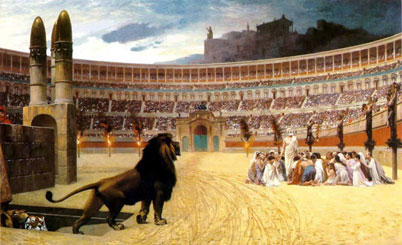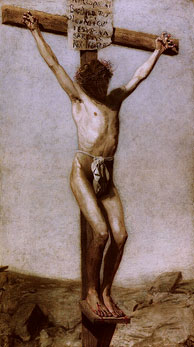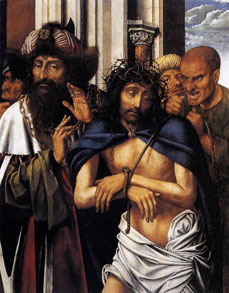
Taking Responsibility by Deborah Beach Giordano
Innocent?
 Hearing this passage, you’d almost believe that Pilate is the victim here: an unwilling pawn in the machinations of wicked priests and the blood-thirsty Jewish population. But then, with any luck, you’d stop and think — and realize that’s a bunch of malarkey.
Hearing this passage, you’d almost believe that Pilate is the victim here: an unwilling pawn in the machinations of wicked priests and the blood-thirsty Jewish population. But then, with any luck, you’d stop and think — and realize that’s a bunch of malarkey.
“There was nothing Pilate could do,” to prevent Jesus’ crucifixion? In a pig’s eye! He was “innocent of Jesus’ blood”? Not hardly! Who, precisely, flogged Jesus and then handed him over to be crucified? Whose orders were the troops following when they carried out the cruel and evil deed?
If Pilate was so convinced of Jesus’ innocence, why didn’t he set him free along with Barabbas? The ultimate authority lay with him; he spoke for Rome. What he said, went.
Then there is the whole issue of the people choosing a prisoner for release. There is no record of any prefect in Judea granting clemency to any criminal as a “Passover gift” to the people — certainly not a “notorious one,” and least of all Pilate, who was openly contemptuous of the Jews. Nor would he have succumbed to mob rule due to “fear that a riot was breaking out;” this was the man who put down uprisings with with such ferocity that he was eventually recalled to Rome and replaced with a more humane representative of the empire.
Pilate couldn’t have cared less what the people wanted. They had no say in the matter. Pilate’s word was the law, and it was on his word that our Lord was convicted, tortured and crucified.
An innocent victim? No way. Pilate was as guilty as the day is long. All of the water in the world couldn’t wash Jesus’ blood from his hands.
Making Nice
The Roman government was directly responsible for Jesus’ death. That is the inconvenient truth that the early church did its best to disguise. They had their reasons.
First and foremost, they wanted to survive.

By the time the gospels were written down, the followers of Jesus had endured various forms of persecution: harassment, exclusion from public office, fines, confiscation of property, and sometimes imprisonment, torture, and murder. Things got particularly grim during the reign of Nero, who instituted a pogrom against Christians — including mass crucifixions and deadly meet-ups with gladiators in the coliseum.
Even the most tolerant emperors kept a close watch on this suspicious group with their strange rituals and private meetings. It would be the work of a moment to classify them as enemies of the state and so be rid of these characters once and for all. It was important, therefore, for Christians to represent themselves as loyal — though nonconforming — citizens, without any resentment against Rome.
As widely celebrated as martyrs for the faith may be, if every Christian had ended up as a lion’s lunch there wouldn’t have been anyone left to spread the Good News. And so it is quite understandable that they sought to downplay the empire’s role in the death of their Lord — as well as the fact that Jesus was executed for treason.
King of the Jews
Over his head they put the charge against him, which read, “This is Jesus, the King of the Jews.”
~ Matthew 27:37

Jesus was crucified for the crime of attempting to overthrow the Roman rule of Judea, as the charge against him stated. There was no king of the Jews as far as Rome was concerned, for the Jews had no kingdom; their land and their lives were under the authority of Caesar. To suggest otherwise was treason: evoking the ideal of an independent Jewish state led by a descendant of King David, who had slain the Goliath that menaced the Hebrew people of his era — a parallel that we can be sure wasn’t lost on Rome.
Then there was Jesus’ dramatic entry into the City during the holy days celebrating the deliverance of the Jewish people from slavery into freedom. Accompanied by a crowd shouting hosannahs, it looked very much like a king’s triumphal return.
Pilate may indeed have ordered Jesus’ execution out of fear that a riot would break out. But perhaps he took that action because the people were in support of the one “who is called the Messiah,” rather than calling for his death.
You can almost hear Pilate’s angry response: “‘King of the Jews’? I’ll show you the king of the Jews! Take a good look at what we can do to your would-be ruler; in our hands he is a joke, a nothing: a scarecrow in a torn cloak and a crown of thorns hanging from a cross. This is what happens to those who dare to challenge Caesar’s authority; this is how the power of Rome crushes her enemies.”
It was exactly the kind of response to be expected from a frightened, frustrated petty bureaucrat like Pontius Pilate. And it was the kind of response the early church wanted to avoid having repeated.
The Kingdom is Here
 Times had changed, people had changed, and for some people the concept of “Messiah” had changed.
Times had changed, people had changed, and for some people the concept of “Messiah” had changed.
The Christians who were living fifty or seventy-five years after the events of that fateful Passover had no intention of overthrowing the government; they weren’t interested in setting up a new ruler over Judea or anywhere else. They understood that Jesus had instituted a kingdom “not made with human hands,” a kingdom of which they were citizens — and in which they would dwell, forever and ever.
The early Christians had no desire to condemn Rome (nor, certainly, in being condemned by it), but to redeem it. Through prayer and patient practice of their faith they hoped to convince the nation to “find no fault” in the Lord they followed, and to come to recognize him as the true King of kings.
Assigning Blame
Still, Jesus had been crucified by Roman authority, and Pontius Pilate was directly responsible. Therefore, it must have seemed a wise course to present him in sympathetic terms — as one who was forced to crucify Jesus because there was no alternative; a victim of circumstances and other peoples’ bloody-mindedness (“And the crowd shouted even louder, ‘Crucify him! Crucify him!’”).
As we have seen, there was plenty of blame to go around. There was Judas, who handed Jesus over for thirty pieces of silver, the religious authorities who considered him a dangerous heretic, the disciples who abandoned Jesus upon his arrest, the eager supporters who suddenly vanished, Pilate himself, and the soldiers who arrested, abused and then crucified the Lord.
But no one wanted to blame the agents of Rome for the death of the Savior, many of whom had since come to believe in the Lord. Nor did they want to admit the failings of the original disciples who had, since that time, acquitted themselves most admirably.
Excluding the Excluders

Instead, the real responsibility, they decided, lay with the people who hadn’t believed then, and who still refused to accept Jesus as the Messiah. These were the very ones the Lord came especially to save: the lost sheep of Israel (Mt 15:24).
These early Christians had decided that the cause of all the trouble — as this passage makes clear — was “those darned Jews.”
This wasn’t anti-Semitism. They knew full-well that Jesus was a Jew and that his first followers were also Jews. The fact is that many of these same people had considered themselves Jews until quite recently.
Shortly before the Gospels were written those who followed Jesus were part of the Jewish worshipping community. But the time came when their practices and beliefs could no longer be tolerated; their insistence that the man of Nazareth was God’s anointed One was unacceptable: it did not fit with the traditional understanding of who and what the Messiah was. And if, as they claimed, this Jesus was truly God’s son, why didn’t God rescue him from the cross?
The exiled Jesus-followers must have felt frustrated and resentful; it was deja vu all over again. Despite hearing the Message, the religious authorities were rejecting the Lord Christ. They simply closed their ears and refused to listen.
So, when it came to assigning blame for Jesus’ death, who better than the sanctimonious “Jews” that had just booted them out of the synagogues? It was a repetition of the same hostility the Lord had experienced when he himself had preached to them. Fifty years later nothing had changed; the children were as guilty as their parents before them.
Gospel
“His blood be on us and on our children!”
What began as angry hyperbole became.… well, “gospel.”
An ugly slur against the people of God turned into a doctrine of faith: the “blood guilt” ascribed to Jews for the death of Christ. We Christians owe it to ourselves and to the rest of the world to admit that it holds no basis in fact.
 Pontius Pilate was not a victim; he decreed, of his own free will, that Jesus should be executed. Judea was not a democracy: there was no public vote on the release of a prisoner, and thus no ethnic burden of responsibility. When Jesus was crucified it was Roman soldiers who drove the nails in his hands, while his Jewish friends and followers watched helplessly and wept.
Pontius Pilate was not a victim; he decreed, of his own free will, that Jesus should be executed. Judea was not a democracy: there was no public vote on the release of a prisoner, and thus no ethnic burden of responsibility. When Jesus was crucified it was Roman soldiers who drove the nails in his hands, while his Jewish friends and followers watched helplessly and wept.
The tragedy is that this blame game (scapegoating) took root — because it is oh-so-easy to point fingers elsewhere! — and became far more powerful and virulent than any of its originators could have imagined or intended. It formed the foundation for centuries of prejudice and discrimination and has been used to justify abuse, murder, and genocide.
Truth-Speaking
“What is truth?” ~ Pontius Pilate
Watch your thoughts. They become words. Watch your words. They become deeds. Watch your deeds. They become habits. Watch your habits. They become character. Character is everything.
And it all started so simply. To avoid the enmity of the Roman empire, a small, inconsequential religious community blamed another for the death of their founder. At the time almost nobody paid any attention to this group, and fewer cared about their squabbles. It was only later, much later, when Christianity became a powerful political force that this accusation would return to haunt them. For the blood of the victimized Jews was now on their hands.
That blood is on our hands as well, when we fail to refute the blood libel that the Jewish people were responsible for the death of our Lord.
As we have seen, there is plenty of guilt to go around when it comes to the betrayal of Jesus Christ including — and perhaps especially — when we blame others for the faults that are our own.
Virtual hugs and real-time blessings,
Deborah ✟
Suggested Spiritual Exercise
In your life who have you crucified — with angry words, hateful thoughts, or harmful deeds?